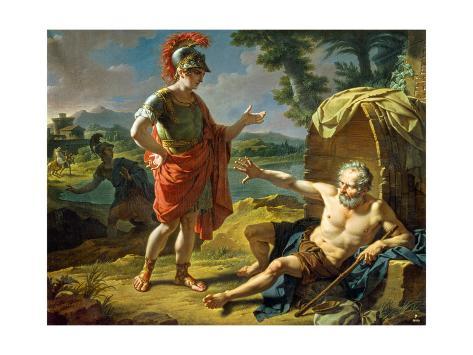


Diogenes was described by contemporaries as “doggish” because of his honesty and a complete indifference to worldly possessions and pretence-to say nothing of his habit of casually urinating in public. “The expressions on the faces of these dogs are almost human, so well do they tell their story.” “Probably Landseer meant his picture to call attention to the vanities of human nature, and to make us smile at them,” wrote an art critic a generation after Landseer’s death. Among many traditional renderings of the theme that could have inspired Landseer is the one seen here, by the 15th-century Flemish master Caspar de Crayer. Landseer’s take on “Alexander and Diogenes” echoes Old Master depictions of the famous meeting down to such fine detail as the overturned tub in which the unworldly Diogenes lived. Dozens of painters have immortalized it on canvas, but none so whimsically as Landseer. This encounter between the world’s most powerful man and an eccentric but fearless philosopher has inspired artists for centuries.

“At this answer, they say, Alexander was so surprised and admired so much the arrogant greatness of the man who had scorned him, that as they went away, he said to his companions who were laughing at him, ‘Nevertheless, if I were not Alexander I would be Diogenes.’ ” Diogenes replied, ‘Yes, Move over a little-you’re blocking my sun.’ ” Alexander greeted him and asked him if he wanted anything. At the approach of so many people, he sat up a little and turned his gaze on Alexander. “So Alexander went to him and found him lying stretched out on the ground, sunning himself. But Diogenes paid not the least attention to Alexander and went on enjoying his leisure.” Many officials and philosophers came to greet him, and he expected that Diogenes would do the same. “The Greeks assembled at the Isthmus and voted to send an expedition under Alexander against Persia, and proclaimed him their leader. Plutarch, the foremost biographer of antiquity, provides the background: He was said to be the Queen’s favorite artist, and to this day museums and private collectors treasure his works.īut the amusing little dogatelle related here begins not in Victoria’s British Empire but in the Macedonian empire built in the fourth century b.c. Sir Edwin Landseer (1802–73) was Victorian England’s leading painter of canine subjects.


 0 kommentar(er)
0 kommentar(er)
